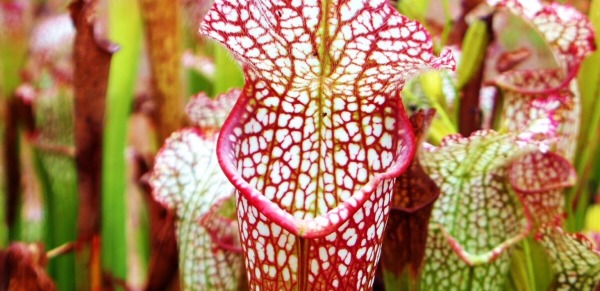Believe it or not, the carnivorous-plants known as pitcher plants actually use a relatively complex strategy to maximize the number of ants that they catch, new research has shown.
The plants actually use what is probably one of the oldest tricks in the book as far as strategy goes — randomization, makes yourself one way some of the time, a different way some of the other time.
You might not think that randomization is that important or impressive, but it’s actually an incredibly difficult thing for living creatures (most certainly including humans) to do. Living things are the products of, and in many ways captive to, patterns and habits. There’s actually quite a lot of evidence to suggest that the need for an easy-means of adding randomization to competitive/military strategy is what led to the creation of dice as well as other forms of “divination”.
As far as the new research, it was the result of researchers puzzling as to how the pitcher plants were able to repeatedly catch large ‘batches’ of ants from the same species/colonies — wouldn’t said success be self-limiting?
Not if it’s done cleverly, apparently. The pitcher plants in this case, alternate between periods when their traps are ‘on’ and ‘off’ — thereby allowing for scout-ants to find the sweet nectar that the plant is full of with no issue, and then head back to the colony to recruit others before returning to what is, now, a slippery death-trap.
According to researcher, Dr Ulrike Bauer, from Bristol’s School of Biological Sciences: “The plant’s key trapping surface is extremely slippery when wet but not when dry. For up to eight hours during dry days, these traps are ‘switched off’ and do not capture any of their insect visitors. At first sight, this is puzzling because natural selection should favour traps that catch as many insects as possible.”
Here’s the way the press release put it:
Surveys of wild plants in Borneo revealed that the traps sporadically captured large ‘batches’ of ants from the same species. The researchers then conducted experiments in which they artificially kept the trapping surfaces wet all the time. They found that wetted plants no longer captured large ‘batches’ of ants.
“Ants are social insects,” Dr Bauer explained. “Individual ‘scout’ ants search the surroundings of the nest for profitable food sources. When they find a pitcher trap full of sweet nectar, they go back to the colony and recruit many more ant workers. However, a trap that is super-slippery all the time will capture most of these scout ants and cut off its own prey supply.”
The researchers found that ant recruitment was impeded when the traps were continually kept wet.
Dr Bauer continued: “By ‘switching off’ their traps for part of the day, pitcher plants ensure that scout ants can return safely to the colony and recruit nest-mates to the trap. Later, when the pitcher becomes wet, these followers get caught in one sweep. What looks like a disadvantage at first sight, turns out to be a clever strategy to exploit the recruitment behaviour of social insects.”
Not quite on the level of strategy needed to allow animals like chimps to hunt and kill lions, but an impressive use of strategy nonetheless — whether one wants to argue about whether it’s “intentional” or not, the pitcher plant is clearly getting the better of this exchange, which is what good strategy is all about.
The new findings are detailed in a paper titled “How to catch more prey with less effective traps: explaining the evolution of temporarily inactive traps in carnivorous pitcher plants” — just published in the Proceedings of the Royal Society B.

The article is about tropical Old World pitcher plants – Nepenthes. Not about Sarracenia as illustrated.
consciousless intelligent is the fear of scientist when it comes to artificial intelligence.
when problem is solved without a conscious thought but with random action and reaction. another words punch all the keys until you get the right answer.
nature is perfect at random actions. it is beautiful in problem solving. it’s why human is so •••• up.
“Dry periods”? Sun, lack (or reduction) of humidity or dew – these all can contribute to “dry spells”. Conclusions, if supported by complete science, need to be explained in full and not convey inaccurate results or bias.